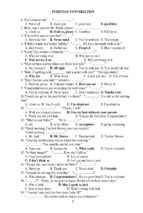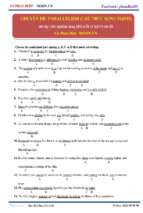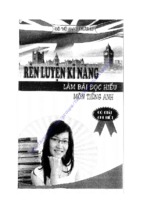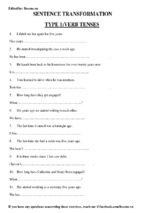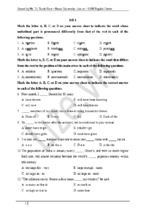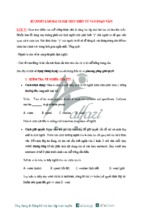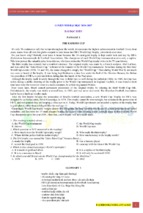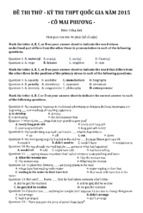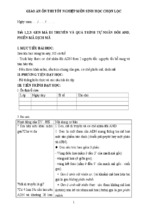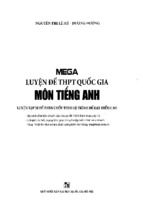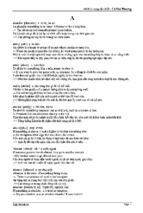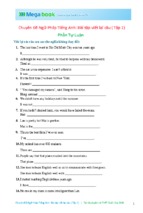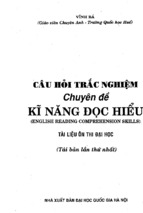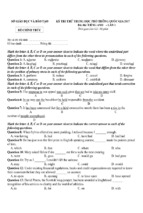Shared by Ms. Ta Thanh Hien – Hanoi University - lize.vn – H&H English Centre
ĐỀ 1
Mark the letter A, B, C, or D on your answer sheet to indicate the word whose
underlined part is pronounced differently from that of the rest in each of the
following questions.
1. A. butcher
B. Dutch
C. clutch
D. crutch
2. A. casebook
B. briefcase
C. suitcase
D. purchase
3. A. level
B. scenic
C. epidemic
D. penalty
Mark the letter A, B, C, or D on your answer sheet to indicate the word that differs
from the rest in the position of the main stress in each of the following questions.
4. A. solicitor
B. spacious
C, sequence
D. separately
5. A, miraculously
B. automatically
C. metropolitan
D. abnormality
Mark the letter A, B, C, or D on your answer sheet to indicate the correct answer
to each of the following questions.
6. Next month, I _____ Dereck for 20 years.
A. have known
B. will have been knowing
C. will now
D, will have known
7. _____ members of my family has a share in doing household chores.
A. None of
B. Every
C. All
D. Each of the
8. He _____ to the doctor after the accident, but he continued to play instead.
A. didn't have to go
B. couldn’t go
C. should have gone
D. must have gone
9. I've told you _____ hundred times not to come into _____ room with _____ hat on.
A. a-a-a
B. an-the-a
C. Ø-a-a
D. a-the-the
10. The population of India is already nearly _____ China’s, and with its much higher
birth-rate, will almost certainly become the world’s _____ populous country within
this century.
A. too large for - very
B. large enough - more
C. so large as - so
D. as large as - most
11. “The inflation rate in Greece is five times _____ my country,” he said.
A. as many as that in
B. as much as
C. as high as that in
D. more than
1
Shared by Ms. Ta Thanh Hien – Hanoi University - lize.vn – H&H English Centre
12. _____ we invested in telecommunications industry, we would be rich now.
A. Had
B. Were
C. Would
D. Should
13. Though they had been robbed _____ all their money, they were able to come home.
A. away
B. of
C. off
D. up
14. Loudly applauding the speech, _____ quickly left the stage.
A. the audience saw the speaker
B. the speaker waved to the audience and
C. the speaker waving to the audience
D. the audience watched as the speaker
15. Having been asked to speak at the convention, _____.
A. Dr. John prepared some notes
B. some notes were prepared for Dr. John
C. the convention members were pleased to hear Dr. John
D. some notes were prepared carefully by Dr. John
16. Nebraska has floods in some years, _____.
A. while other droughts
B. droughts are others
C. others in drought
D. in others drought
17. Physical fitness exercises can cause injuries _____ the participants are not careful.
A. if
B. to
C. what
D. that
18. “Should we bring a lot of money on the trip?” “Yes. _____ we decide to stay
longer.”
A. So that
B. Though
C. In case
D. Because
19. If you want to get better, do exactly _____ your doctor tells you.
A. the same
B. alike
C. like
D. as
20. The police carried out a _____ search for the missing diplomat.
A. thoughtful
B. thorough
C. through
D. throughout
21. Many traffic accidents are _____ by carelessness and impatience.
A. caused
B. resulted
C. occurred
D. happened
22. He needs a car for his job but he just can’t _____ one at the moment.
A. make
B. take
C. afford
D. pay
23. The decision I was to take was so risky that I had to think _____.
Shared by Ms. Ta Thanh Hien – Hanoi University - lize.vn – H&H English Centre
A. comprehensively
B. profoundly
C. reluctantly
D. simultaneously
24. Thunderstorm and lightning posted a significant threat to the safety of the performers
on stage so they had to _____ the show.
A. call off
B. go on
C. give in
D. live on
25. Don’t worry we’ll have to wait a little longer because I’m sure he will _____.
A. turn down
B. turn in
C. turn into
D. turn up
26. They are leaving the district, so they have put their house up for _____.
A. offer
B. sale
C. purchase
D. trade
27. If you refuse to do it, the bosses will have no difficulty _____ the job.
A. to get one of those ambitious young men to do
B. with getting one of those ambitious young men do
C. in getting one of those ambitious young men to do
D. getting one of those ambitious young men do
28. Lindy: “Do you mind the window being open?” Maya: “_____, it’s much too cold.”
A. I’m afraid I don’t
B. No, I don’t
C. Yes, I do mind
D. Yes, please
29. Rose: “Is there anything I can do for you, sir?” Linda: “_____”
A. Sure, go ahead, please.
B. Not now. Thanks anyway.
C. Yes, you’re welcome.
D. OK, your time.
30. “Where were you yesterday?” “_____”
A. I feel sick.
B. I will be out tomorrow.
C. I was at an all-day conference.
D. I’m going to special training.
Mark the letter A, B, C or D on your answer sheet to indicate the word(s) that is
CLOSEST in meaning to the underlined part in each of the following questions.
31. The venom of coral snakes is especially potent and the mortality rate among humans
who have been bitten is high.
A. impure
B. powerful
C. contagious
D. abundant
32. Laws on military service since 1960 still hold good.
A. remain in effect
B. remain for good
C. stand in life
D. are in good condition
3
Shared by Ms. Ta Thanh Hien – Hanoi University - lize.vn – H&H English Centre
33. In astronomy, a scale of magnitude from one to six denotes the brightness of a star.
A. examines
B. signifies
C. predicts
D. contrasts
Mark the letter A, B, C or D on your answer sheet to indicate the word(s) that is
OPPOSITE in meaning to the underlined part in each of the following questions.
34. Strongly advocating health foods, Jane doesn’t eat any chocolate.
A. denying
B. impugning
C. supporting
D. advising
35. Unless the two signatures are identical, the bank won’t honor the check.
A. different
B. genuine
C. fake
D. similar
Mark the letter A, B, C, or D on your answer sheet to show the underlined part
that needs correction in each of the following questions,
36. The bridge (A) was hitting by a large ship (B) during a (C) sudden storm (D) last
week.
37. A film isn’t worth (A) to watch, (B) whatever its subject, unless it engages the (C)
viewer’s mind and makes (D) him think.
38. Every year, tornadoes (A) cause a lot of (B) damages to property and a (C)
tremendous loss of human and (D) animal life.
39. (A) Linda being (B) chosen as the (C) most outstanding student on her campus (D)
made her parents very happy.
40. He (A) has hardly never given a (B) more impressive (C) performance than (D) this.
Read the following passage and mark the letter A, B, C, or D on your answer sheet
to indicate the correct word or phrase that best fits each of the numbered blanks
from 41 to 50.
The 25th meeting of the FAO Committee on Fisheries (COFI) that will take place in
February 2003 comes at a (41) _____ time in the quest for sustainable fisheries. Meeting
in Johannesburg at the World Summit on Sustainable Development in 2002, world
leaders (42) _____ the vital role of marine fisheries to economic and food security and
to biodiversity in general. Leaders established a number of fisheries commitments for
the world community, (43) _____ a call “to maintain or restore stocks to levels that can
produce maximum sustainable (44) _____ with the aim of achieving these goals for
depleted stocks on an urgent basis and where possible not later than 2015.”
The mission of FAO in the field of fisheries is to (45) _____ and secure the long-term
Shared by Ms. Ta Thanh Hien – Hanoi University - lize.vn – H&H English Centre
sustainable development and utilization of the world’s fisheries and aquaculture. Many
of the issues (46) _____ the agenda for the 2003 COFI meeting will contribute directly
to the goal of restoring depleted fish stocks and to (47) _____ other commitments.
If we are to fulfill these commitments, we must take (48) _____ actions and set clear
priorities. The most recent FAO statistics indicate that over 70 percent of fisheries are
(49) _____ overfished or are fished at their maximum capacity. In coming years,
production from many key fisheries will likely decline. Demand for fisheries products,
(50) _____, will continue to increase. The prospect of this growing shortfall poses our
greatest fisheries challenge today.
(Extracted from Info USA - CD Version)
41. A. busy
B. critical
C. serious
D. fine
42. A. declared
B. claimed
C. accepted
D. acknowledged
43. A. giving
B. making
C. including
D. containing
44. A. volume
B. quantity
C. amount
D. yield
45. A. aid
B. meet
C. provide
D. facilitate
46. A. on
B. with
C. in
D. for
47. A. advancement
B. advancing
C. advanced
D. advance
48. A. determined
B. concentrated
C. concerted
D. focused
49. A. both
B. or
C. either
D. neither
50. A. however
B. consequently
C. so
D. therefore
Read the following passage and mark the letter A, B, C, or D on your answer sheet
to indicate the correct answer to each of the questions from 51 to 60.
Whether you call it a “gap year”, a “year out”, or a “year off’, the decision to delay
going to university for a year after leaving school is a difficult, but important, one.
Becky Roberts, now studying History at the University of Warwick, doesn’t regret her
decision to take a year off. “I’d worked so hard for my A levels,” she says. “I knew it
would do me good to do something totally unrelated to studying before embarking on a
three-year degree course. My year off working for my dad’s company wasn’t a holiday
by any means but it was a break from the world of education, and that’s just what I
need.” Carl Sanchez agrees now halfway through a biology degree at Cardiff University.
Carl spent much of his gap year traveling. “I worked for about three months to save up
5
Shared by Ms. Ta Thanh Hien – Hanoi University - lize.vn – H&H English Centre
enough money, then went to stay with some friends who live in France. 1 ended up
traveling round most of Europe, and even got over to Russia for a few weeks, which was
fantastic.”
Both Becky and Carl enjoyed their year off, but do they feel it’s benefited them in
terms of their university life now? “Definitely,” says Carl. “When I left school, I was a
normal, fairly irresponsible eighteen year-old. I hadn’t been anywhere, I hadn’t done
anything. A year later, when 1 went to university, 1 felt much more like an adult than a
child.” “I know a few people at Warwick who took a year off,” says Becky. “Generally,
we’re more dedicated to our studies than those students who came straight from school.
We’ve got different priorities. We want to have fun, of course, but we realize we’re here
to get our degrees, I don’t think some of the others have quite realized why they’re at
university yet.”
There are drawbacks to taking a gap year, though. Penny Cartwright went straight
from school to study medicine at Imperial College, London. “I thought about taking a
gap year but decided against it and don’t regret the decision for a minute. Becoming a
doctor takes such a long time - I’ll be about 26 years old before I can start earning any
money - that the sooner you start, the better, in my opinion. It might be fun, but it’s
really just a wasted year in terms of career development.”
There’s also the financial consideration. If you do decide to take a year off, and you
don’t want to work the whole time as Becky did, you have to be able to pay for it. Susan
Jenkins, a Careers Officer, points out that parents are now less likely to fund their
child’s year off. “Twenty years ago, it was fairly common for parents to say to their son
or daughter, “Here’s two thousand pounds, go and have fun abroad for a few months.”
Nowadays, because parents have to pay so much more for the child’s education while
they’re at university, they just can’t afford to pay for this extra year too.”
One option, of course, is to do what Carl did: work for a few months in order to save
up for a trip abroad. Another option is to find casual work while traveling abroad.
“There are now a lot of books and websites with loads of information for people who
want to do this,” says Susan. “It’s a great way to see the world, gain experience, and get
money for living expenses all at the same time. But don’t expect to earn enough to save
any money.” So, should you take a gap year? The answer is: it depends. If you want a
Shared by Ms. Ta Thanh Hien – Hanoi University - lize.vn – H&H English Centre
break from books and essays, then it’s probably a good idea - as long as you, or your
parents, can afford it and as long as you’re going to do something worthwhile during
your time off. Sitting at home watching TV doesn’t count! If you want to get your
degree and start regular employment as quickly as possible, a gap year may not be so
sensible.
51. Becky took a year off because she _____.
A. wanted to do something different for a while
B. needed to see what working for her father was like
C. felt she needed a long holiday before university
D. had done so well in her A level exams at school
52. Carl says that a year off helped him _____.
A. make friends in many different countries
B. learn the importance of saving money
C. become more mature and experienced
D. become more knowledgeable about geography
53. According to Becky, students who didn’t take a year off _____.
A. are less hard-working than those who did
B. are less intelligent than those who did
C. don’t want to have fun at university
D. probably won’t end up with a degree
54. According to Penny, a year off _____.
A. should be taken when you’re about 26 years old
B. can be enjoyable and useful for your future work
C. is better once you’ve actually started your course
D. merely delays the time when you can get a job
55. In the past, parents were more likely to _____.
A. pay for their child’s education at university
B. give their child money to help with their year off
C. force their child to take a year off before university
D. encourage their child to go straight to university
56. Susan issues a warning about _____.
7
Shared by Ms. Ta Thanh Hien – Hanoi University - lize.vn – H&H English Centre
A. the difficulty of finding casual work
B. low wages for casual work abroad
C. information from books and websites
D. paying for everyday expenses abroad
57. This article would probably NOT appear in _____.
A. a textbook for university students
B. a handbook for school-leavers
C. the education section of a newspaper
D. a magazine for young people
58. What is the attitude of the author towards a gap year?
A. positive
B. negative
C. neutral
D. skeptical
59. What is the most suitable title for the passage?
A. Disadvantages of a gap year.
B. A gap year: Chance or challenge?
C. Advantages of a gap year
D. A gap year: Should or shouldn’t?
60. To whom is the article most likely to be recommended?
A. those in their early teens
B, toddlers
C. those in their late teens
D. pensioners
Read the following passage and mark the letter A, B, C, or D on your answer sheet
to indicate the correct answer to each of the questions from 61 to 70.
Scientists have discovered the bones of what may be the largest meat-eating
dinosaurs ever to walk the earth. The discovery was made by a team of researchers from
Argentina and North America in Patagonia, a desert on the eastern slopes of the Andes
in South America. Besides the interesting fact that the dinosaur was huge and
horrifying, it is even more astounding that the bones of a number of the dinosaurs were
found together. This discovery challenges the prior theory that the biggest meat-eaters
lived as loners and instead indicates that they may have lived and hunted in packs. The
Tyrannosaurus Rex lived in North America and was believed to hunt and live alone.
The newly discovered meat-eaters appears to be related to the Giganotosaurus
family, being as closely related to it as a fox would be to a dog. It is actually not of the
same family at all as the Tyrannosaurus Rex, being as different from it as a cat is from a
dog.
Shared by Ms. Ta Thanh Hien – Hanoi University - lize.vn – H&H English Centre
The fossilized remains indicate that the animals lived about 100 million years ago.
With needle-shaped noses and razor sharp teeth, they were larger than the
Tyrannosaurus Rex, although their legs were slightly shorter, and their jaws were
designed to be better able to dissect their prey quickly and precisely.
61. The author states that the newly discovered dinosaur remains are evidence that it was
the largest _____.
A. dinosaur ever
B. carnivorous dinosaur
C. herbivorous dinosaur
D. South American dinosaur
62. The word “Besides” in the first paragraph is closest in meaning to _____.
A. in spite of
B. in addition to
C. although
D. mostly
63. The word “horrifying” in the first paragraph is closest in meaning to _____.
A. frightening
B. large
C. fast
D. interesting
64. The word “astounding” in the first paragraph is closest in meaning to _____.
A. terrifying
B. pleasing
C. displeasing
D. surprising
65. The author implies that the most interesting fact about the discovery is that this
dinosaur _____.
A. lived and hunted with others
B. had a powerful jaw and sharp teeth
C. was found in the Andes
D. was larger than the Tyrannosaurus Rex
66. The passage indicates that prior to this discovery scientists believe that _____.
A. meat-eating dinosaurs lived alone
B. there were no meat-eating dinosaurs in the Andes
C. the Tyrannosaurus Rex lived in the Andes
D. meat-eating dinosaurs were small in height
67. The word “it” in the second paragraph refers to _____.
A. newly discovered meat-eater
B. relationship
C. Giganotosaurus
D. dog
68. The author states that the newly discovered meat-eating dinosaur is _____.
A. closely related to the Tyrannosaurus Rex
B. not closely related to the Tyrannosaurus Rex
C. not closely related to the Giganotosaurus
D. closely related to the large cat family
9
Shared by Ms. Ta Thanh Hien – Hanoi University - lize.vn – H&H English Centre
69. The word “dissect” in the last sentence is closest in meaning to _____
A. dismember
B. swallow
C. chew
D. escape
70. The word “prey” in the last sentence is closest in meaning to _____.
A. victim
B. enemy
C. dinosaur
D. attacker
Mark the letter A, B, C, or D on your answer sheet to indicate the sentence that is
CLOSEST in meaning to the sentence given in each of the following questions.
71. John is devoted to his work.
A. John spends all his time working.
B. John is interested in his work.
C. John dedicates himself for working.
D. Working makes John find himself helpful.
72. He is three weeks behind with the rent.
A. He owes three weeks’ rent.
B. He hires this for three weeks.
C. He will pay for the rent after three weeks.
D. He will pay for the rent in three weeks.
73. Nobody at all came to the meeting.
A. Not many people came to the meeting.
B. Not a single person came to the meeting.
C. Only a few people came to the meeting.
D. There was almost nobody at the meeting.
74. “How long have you worked here?” he asked.
A. He asked me how long I had worked there.
B. He asked me for how long I had worked there.
C. He asked me if I had worked there long.
D. He asked me how long had I worked there.
75. “Why don’t you get your hair cut, Gavin?” said Adam.
A. Adam suggested that Gavin should have his haircut.
B. It was suggestible that Adam get Gavin’s haircut.
C. Adam advised Gavin to cut his hair.
D. Gavin was suggested to have a haircut.
Shared by Ms. Ta Thanh Hien – Hanoi University - lize.vn – H&H English Centre
Mark the letter A, B, C, or D on your answer sheet to indicate the sentence that
best combines the pair of sentences given in each of the following questions.
76. The referee brought the football game to a halt. He blew his whistle.
A. The referee stopped playing football and blowing his whistle.
B. The referee stopped the football game before he blew his whistle.
C. Having stopped the football match, the referee blew his whistle.
D. The referee brought the football game to a halt by blowing his whistle.
77. He is a successful man in his career. He possesses a large number of shares of the
company.
A. He becomes successful in his career by possessing a large number of shares of
the company.
B. Given the large number of shares of the company he possesses, he is successful
in his career.
C. Successful as he is in his career, shares of the company he possesses are modest.
D. Given a large number of shares by the company he possesses, he is successful in
his career.
78. We planned to visit Petronas in the afternoon. We could not afford the fee, however.
A. As planned, we could not afford the visit to Petronas in the afternoon because of
the fee.
B. We visited Petronas in the afternoon though the fee was too high for us.
C. We were going to visit Petronas in the afternoon but the fee was too high for us.
D. The fee was, however, high enough for us to plan a visit to Petronas in the
afternoon.
79. The new restaurant looks good. However, it seems to have few customers.
A. In order to get more business, the new restaurant should improve its appearance.
B. The new restaurant would have more customers if it looked better.
C. If it had a few more customers, the new restaurant would look better.
D. In spite of its appearance, the new restaurant does not appear to attract much
business.
80. I am very unhappy about the grade I made on my biology exam. I know I should
have studied more.
11
Shared by Ms. Ta Thanh Hien – Hanoi University - lize.vn – H&H English Centre
A. I know I should have studied more because I am very unhappy about the grade I
made on my biology exam.
B. I am very unhappy about the grade I made on my biology exam so I know I
should have studied more.
C. I am very unhappy about the grade I made on my biology exam, yet I know I
should have studied more.
D. I am very unhappy about the grade I made on my biology exam but I know I
should have studied more.
Shared by Ms. Ta Thanh Hien – Hanoi University - lize.vn – H&H English Centre
ĐỀ 2
Mark the letter A, B, C, or D on your answer sheet to indicate the word whose
underlined part is pronounced differently from that of the rest in each of the
following questions.
1. A. actually
B. student
C. situation
D. statue
2. A. useless
B. bus
C. nose
D. horse
3. A. edition
B. diameter
C. editor
D. event
Mark the letter A, B, C, or D on your answer sheet to indicate the word that differs
from the rest in the position of the main stress in each of the following questions.
4. A, intuitive
B. decorative
C. accusative
D. acquisitive
5. A. international
B. assassinated
C. differentiate
D. preferential
Mark the letter A, B, C, or D on your answer sheet to indicate the correct answer
to each of the following questions.
6. By the time you _____ washing, your children _____ their homework.
A. finished - have done
B. finish - will have done
C. are finishing - will be doing
D. have finished - will do
7. “Their team isn’t doing very well this season.” - “That’s true. They _____ every
game so far.”
A. have lost
B. had lost
C. are losing
D. lose
8. Franklin D. Roosevelt was _____ the great force of radio and the opportunity it
provided for taking government policies directly to the people.
A. the first President fully understood
B. the first President that, to fully understand
C. as the first President he understood fully
D. the first President to fully understand
9. _____ giraffe is the tallest of all _____ animals.
A. Ø - The
B.A-Ø
C. A-the
D. The - Ø
10. Is this the address to _____ you want the package sent?
A. whom
B. where
C. that
11. In Europe _____ people are getting married these days and
together outside marriage.
13
D. which
people
are
living
Shared by Ms. Ta Thanh Hien – Hanoi University - lize.vn – H&H English Centre
A. too many - so a lot of
B. far fewer - more
C. so many - less
D. such a lot of - such many
12. Unless you tell the truth to the police, _____.
A. you won’t be severely punished
B. they will let you go unpunished
C. they will give you severely punishment
D. you will be severely punished
13. I expected it will rain again when we’re on holiday this year; but at least we are
properly prepared _____ it this time.
A. with
B. for
C. about
D. at
14. For more than a decade, _____ that certain species are becoming scarce.
A. a warning for bird-watchers
B. warn the bird-watcher
C. the warnings of bird-watchers
D. bird-watchers have warned
15. Not only _____ the exam but she also got a scholarship.
A. she has passed
B. she passed
C. did she pass
D. has she passed
16. Released in 1915, _____.
A. the subject of D.W. Griffith’s epic film Birth of a Nation was the Civil War.
B. D.W. Griffith’s epic film Birth of a Nation was about the Civil War
C. the Civil War was the subject of D.W. Griffith’s epic film. Birth of a Nation
D. D.W Griffith’s made an epic film about the Civil War, Birth of a Nation
17. In a new culture, many embarrassing situations occur _____ a misunderstanding.
A. as
B. due to
C. for
D. of
18. You have to take the full course of your antibiotics _____ you feel better; _____,
your illness will simply return.
A. even if / otherwise
B. whereas / even if
C. so that / such as
D. although / so that
19. The children won’t go to sleep _____ we leave a light on outside their bedroom.
A. except
B. unless
C. but
D. otherwise
20. While southern California is densely _____, few people live in the northern part of
the state.
Shared by Ms. Ta Thanh Hien – Hanoi University - lize.vn – H&H English Centre
A. population
B. popularized
C. populating
D. populated
21. Our school _____ about 600 new students every year.
A. admits
B. accepts
C. gets
D. allows
C. resemble
D. identify
22. The two sisters greatly _____ each other.
A. care of
B. look after
23. If we want to _____ up with them, we’d better hurry.
A. come
B. approach
C. arrive
D. catch
24. It was the job of the security guard to _____ anyone suspicious hanging around the
restaurant while the president was dining inside.
A. check out of
B. kick out of
C. look out for
D. get away with
25. There’s _____ to be frightened of the dog; he’s quite harmless.
A. no need
B. no use
C. no fear
D. any reason
26. They agreed to the changes _____ that they would be introduced gradually.
A. for the interpretation
B. by the comprehension
C. on the understanding
D. with the conditions
27. Is there any chance _____ the machinery repaired?
A. of being
B. for having
C. of having
D. to have
28. It _____ that the best way to learn to speak a foreign language is to practice using it.
A. stands in relation
B. is a wakeup call
C. stands to reason
D. agrees to differ
29. Peter: “Do you mind if I put the television on?” Susan: _____”
A. You are welcome.
B. No, not in the least.
C. Not mention it.
D. It’s no matter to me.
30. Mike: “Do I still have to change my clothes?” Bob: “_____”
A. The party begins at 2 p.m.
B. Sure, take your time.
C. Let’s discuss that some time.
D. Don’t change your mind, please.
Mark the letter A, B, C or D on your answer sheet to indicate the word(s) that is
CLOSEST in meaning to the underlined part in each of the following questions.
31. There was nothing they could do but leave the car at the roadside where it had
broken down.
A. unless
15
B. except
C. then
D. instead of
Shared by Ms. Ta Thanh Hien – Hanoi University - lize.vn – H&H English Centre
32. The lost hikers stayed alive by eating wild berries and drinking spring water.
A. revived
B. survived
C. surprised
D. lively
33. After her mother died, she was raised by her grandparents.
A. put up
B. brought up
C. come into
D. grown up
Mark the letter A, B, C or D on your answer sheet to indicate the word(s) that is
OPPOSITE in meaning to the underlined part in each of the following questions.
34. Pure water is often a fairly rare commodity that requires significant energy to
produce.
A. Contaminated
B. Clean
C. Unadulterated
D. Flawless
C. naive
D. snooty
35. Why are you being so arrogant?
A. humble
B. cunning
Mark the letter A, B, C, or D on your answer sheet to show the underlined part
that needs correction in each of the following questions.
36. (A) Those of you who signed up (B) for Dr. Daniel’s (C) anthropology class should
get (D) their books as soon as possible.
37. They (A) were all (B) shock at his failure (C) in (D) the competition.
38. Some (A) of the land in that region is (B) so wet and hot and (C) covered with jungle
that (D) a few people live there.
39. The man (A) to who I (B) sold my house (C) was (D) a cheat.
40. People with (A) exceptionally high intelligence quotients may not be (B) the best
employees since they become (C) bored of their work unless the job is constantly (D)
changing,
Read the following passage and mark the letter A, B, C, or D on your answer sheet
to indicate the correct word or phrase that best fits each of the numbered blanks
from 41 to 50.
SCHOOL LUNCH
Research has shown that over half the children in Britain who take their own lunches to
school do not eat (41) _____ in the middle of the day. In Britain schools have to (42)
_____ meals at lunchtime. Children can (43) _____ to bring their own food or have
lunch at the school canteen.
One shocking finding of this research is that school meals are (44) _____ healthier than
Shared by Ms. Ta Thanh Hien – Hanoi University - lize.vn – H&H English Centre
lunches prepared by parents. There are strict standards for the preparation of school
meals, which have to include one portion of fruit and one of vegetables, as well as meat,
a dairy item and starchy food like bread or pasta. Lunchboxes (45) _____ by researchers
contained sweet drinks, crisps and chocolate bars. Children consume twice as much
sugar (46) _____ they should at lunchtime.
The research will provide a better understanding of why the percentage of overweight
students in Britain has (47) _____ in the last decade. Unfortunately, the government
cannot criticise parents, but it can remind them of the (48) _____ value of milk, fruit and
vegetables. Small changes in their children’s diet can (49) _____ their future health.
Children can easily develop bad eating (50) _____ at this age, and parents are the only
ones who can prevent it.
41. A. probably
B. properly
C. appropriately
D. possibly
42. A. provide
B. give
C. do
D. make
43. A. choose
B. want
C. manage
D. prefer
44. A. more
B. less
C. many
D. much
45. A. taken
B. examined
C. found
D. investigated
46. A. as
B. than
C. such
D. so
47. A. increased
B. expanded
C. extended
D. added
48. A. nutritional
B. good
C. positive
D. healthy
49. A. destroy
B. predict
C. affect
D. damage
50. A. habits
B. styles
C. attitudes
D. behaviours
Read the following passage and mark the letter A, B, C, or D on your answer sheet
to indicate the correct answer to each of the questions from 51 to 60.
Hurricanes are one of the most destructive natural forces on the face of the planet.
By definition, they are also known as tropical cyclones. They manifest themselves in the
warm waters of the Atlantic Ocean, usually in the form of a low-pressure weather
system. Due to minimal, high atmospheric winds, those near the surface of the water
begin to spin and spiral in a counterclockwise direction, feeding on the heat from the
ocean. With increased rotation, more water is absorbed into the system and is then
released in the form of showers and thunderstorms. Once the system becomes stronger
and more defined, and sustained wind speeds eclipse speeds of seventy-five miles per
17
Shared by Ms. Ta Thanh Hien – Hanoi University - lize.vn – H&H English Centre
hour, the storm can then be classified as a true hurricane. They pose the greatest threat to
human populations when they track eastward to the tepid waters of the Gulf of Mexico,
where the islands of the Caribbean and the flats of the southeastern United States lie
vulnerable to its path of destruction, which is usually determined by two major factors:
storm surge and movement.
While high winds are commonly associated with the perils of hurricanes, the most
destructive factor is the accompanying storm surge as it strikes land. Still, the torrential
rains and heavy winds the hurricane brings contribute to its storm surge, yet this occurs
in a more indirect way than was previously thought. As the hurricane approaches land,
water levels increase and are pushed onto and through the shoreline, causing major
destruction. The size of the surge itself is determined by the slope of the shore, called
the continental shelf, out into the ocean. If the slope is steep, the storm surge will not be
as great as when it is shallower, which causes a more powerful surge due to the fact that
the ocean’s depth is not great enough to absorb the energy and massive amounts of
water. In fact, scientists have pointed out that one cubic yard of it weighs about 1,700
lbs. Millions of cubic yards of surge can occur from one single storm, which, naturally,
causes catastrophic damage.
Another major contributor to the measure of destruction a hurricane causes is its
movement. The speed of a hurricane as it makes landfall and moves across or inland is a
major deciding factor upon the extent of the damage. Fast-moving hurricanes can often
seem a blessing to the people and communities involved because their high speeds mean
they will move on and away quickly, so they will not have a chance to dump as much
water on the immediate area. However, lazy storms, and especially storms that stall on
the coastline, become the cyclones of devastation. Because they move so slowly or even
not at all and are able to sit spinning and reenergizing themselves from the ocean,
torrential rains, winds, and flooding increase, and the storm surge becomes a perpetual
battering ram of destruction. However, the power of a hurricane becomes immediately
diminished once over land because it is disconnected from its warm water energy
source, but this does not mean it is dead by any means.
When it comes to hurricanes, direct wind destruction is a secondary worry compared
to storm surge, the speed of the hurricanes’ track, and the flooding that is associated
Shared by Ms. Ta Thanh Hien – Hanoi University - lize.vn – H&H English Centre
with them. The shallow continental shelf underlying the Atlantic Ocean and the Gulf of
Mexico off of the southeastern United States coupled with the low-lying landmass
makes the area a prime region for disaster in the form of storm surge and flooding. This,
along with the fickle nature of hurricanes and the inability of experts accurately to
predict a hurricane’s landfall, adds to the turmoil that hurricanes inflict on the
populations of the areas they hit. Not necessarily wind, but water, remains the worst
effect a hurricane can have, as it is able to flood not only the immediate area where the
hurricane strikes but hundreds and hundreds of miles in any given direction as well,
affecting people, homes, and businesses far and wide of its main path.
51. According to paragraph 1, which of the following is true of hurricanes?
A. Storms are classified as hurricanes when gusts reach 75mph.
B. They are only able to form in tropical waters near the Equator.
C. One of the most defining characteristics of a hurricane is its eye.
D. The lack of winds aloft contributes to the formation of hurricanes.
52. Which of the following can be inferred from paragraph 1 about hurricane formation?
A. They are spawned by violent thunderstorms and wind shear.
B. They are fueled by the warm waters of the Pacific Ocean.
C. They are hardly likely to be present in cool oceanic areas.
D. They usually tend to twirl and spin in a clockwise direction.
53. The word “eclipse” in the passage is closest in meaning to _____.
A. exceed
B. maintain
C. propel
D. shadow
54. According to paragraph 2, what contributes to the destruction of storm surge?
A. The torrential rains contained in a hurricane directly affect the surge.
B. The contour of the ocean floor is a major determiner of its size.
C. The weight of the water will destroy anything in its immediate path.
D. The size of the waves is a principal factor in the resulting damage.
55. The word “it” in the passage refers to _____.
A. water
B. energy
C. ocean’s depth
D. cubic yard
56. The author discusses a hurricane’s movement in paragraph 3 in order to _____.
A. downplay the factors of velocity and directional momentum in a hurricane
B. show that a hurricane's tracking speed determines the amount of destruction
19
Shared by Ms. Ta Thanh Hien – Hanoi University - lize.vn – H&H English Centre
C. suggest hurricanes are capable of moving in any direction at any time
D. indicate that slow-moving storms allow people more time to seek safety
57. The word “perpetual” in the passage is closest in meaning to _____
A. wavering
B. damaging
C. incessant
D. chronic
58. Which of the following is NOT true of the major forces of a hurricane?
A. All coastlines are affected by its storm surge.
B. Fast-moving hurricanes ironically help lessen damages.
C. Flooding is usually much more destructive than winds.
D. Strong winds and rain add to its storm surge.
59. According to paragraph 4, which of the following is true of a hurricane’s winds?
A. No other force of a hurricane can inflict more punishment than wind.
B. Low-lying areas are more prone to wind forces than elevated areas.
C. The direction of the winds, not speed, makes them the most dangerous.
D. Their destruction is short-lived, unlike the effects of major floods.
60. Which of the sentences below best expresses the essential information in the
underlined sentence in the passage?
A. Flooding, which causes havoc in a very wide range of areas, is the most
destructive factor of a hurricane.
B. Water levels do the most destruction hundreds of miles inside the hurricane,
where the hurricane affects the most people.
C. Cities in the direct path of a hurricane suffer the brunt of its power through
flooding while the wind does little damage.
D. Winds and rain damage people, homes, and businesses every time a hurricane
strikes a certain area.
Read the following passage and mark the letter A, B, C, or D on your answer sheet
to indicate the correct answer to each of the questions from 61 to 70.
The miracle therapy of blood transfusion was invented by an English doctor, James
Blundell. In 1818, he performed the first transfusion on a patient said to be incurable.
Using a syringe, he successfully injected blood taken from one of his students. In 1829,
he saved a woman suffering from a severe hemorrhage. About 1900, Dr. Karl
Landsteiner of Vienna found that some people’s blood was not compatible with others’
- Xem thêm -

